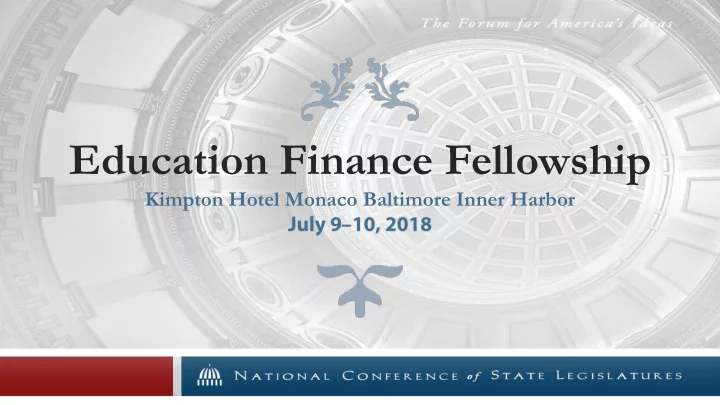

Education Finance Fellowship Kimpton Hotel Monaco Baltimore Inner Harbor
COST DIFFERENTIALS
“As one pessimist has opined, school finance reform is like a Russian novel: it's long, tedious, and everybody dies in the end.” – Mark G. Yudof, School Finance Reform in Texas: The Edgewood Saga, 28 Harv. J. on Legis. 499 (1991).
The term ‘cost’ in economics refers to the minimum spending required to produce a given level of output. Applied to education, cost represents the minimum spending required to bring students in a district up to a given performance level. Education costs can be affected by three categories of factors…: 1. Geographic differences in resource prices; 2. District size; and 3. The special needs of some students. Duncombe, W. D., Nguyen-Hoang, P., & Yinger, J. M. (2015). Measurement of Cost Differentials. In H. F. Ladd & M. E. Goertz (Eds.), Handbook of Research in Education Finance and Policy (2nd ed., p. 260). Abingdon: Routledge.
Count (weighted average daily Weight Category Additional Weight membership or ADM w ) Special Education and At Risk Weights Individual Education Program 1 2 English as a Second Language 0.5 1.5 Pregnant and Parenting 1 2 Students in Poverty Adjusted 0.25 1.25 Neglected and Delinquent 0.25 1.25 Students in Foster Care 0.25 1.25 Grade and School Weights Kindergarten -0.5 0.5 Elementary District -0.1 0.9 Union High District 0.2 1.2 Remote Small School Varies Varies ( see Or. Rev. Stat. § 327.013(1)(c))
APPENDIX
“Of course defining what is adequate is not straightforward either at a conceptual level or in practice.... The central question is: adequate for what? One answer might lie in the Rawlsian concept of primary goods and the notion that every student should attain a minimum set of educational outcomes connected to his or her long-term life chances.” – Ladd, H. F. (2008). Reflections on Equity, Adequacy, and Weighted Student Funding. Education Finance and Policy , 3 (4), 412.
“The founding model in this place was super old school — a competition of ideas is fundamental to a free society, which was so subversive in the ’30s and ’40s because there was no competition of ideas. Disagreement is the essence of how we can unify as a people. We have a moral consensus about pushing opportunity out to people who need it most. Then we actually have to become a constellation of disagreement around that so that we can find the best way to do it. In the same way that you need a competition within the economy so that you can serve consumers best. Competition is hugely important in all areas. It’s a moral good.” – Arthur Brooks, President, American Enterprise Institute
Recommend
More recommend